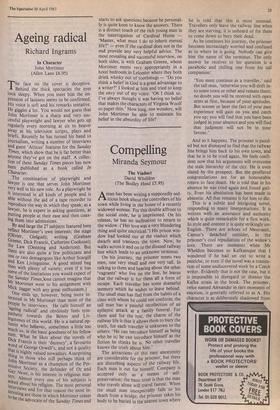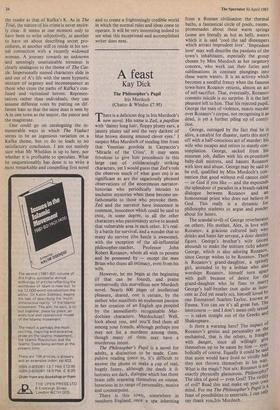Compelling
Miranda Seymour
man has been writing a supposedly sed- itious book about the controllers of his town while living in the house of a recently widowed woman. For this double affront to the social code, he is imprisoned. On his release, he has no inclination to return to the widow. ('Her love was a very blundering thing and quite uncritical.') His prison win- dow had looked out at the viaduct which dwarfs and transects the town. Now, he walks across it and on to the disused railway line which leads to an unknown terminus.
On his journey, the prisoner meets two men, one very small and one very tall. In talking to them and hearing about the other `vagrants' who live on the line, he learns that the railway is for them all a form of escape. Each traveller has some shameful memory which he wishes to leave behind. The small man has fled from the habits of a class with whom he could not conform; the tall man has a painful recollection of an epileptic attack at a family funeral. For them and for the rest, the charm of the railway life is that it allows them to bury the truth, for each traveller is unknown to the others: 'He can introduce himself as being who he is; he can introduce himself as the fiction he thinks he is. No other traveller knows the truth about him.'
The attractions of this easy anonymity are considerable for the prisoner, but there are disturbing aspects of the railway life. Each man is out for himself. Company is accepted only as a means of self- preservation; the basic tenet is that the man who travels alone will travel fastest. When the small man unexpectedly falls to his death from a bridge, the prisoner takes his body to be buried in the nearest town where he is told that this is most unusual. Travellers only leave the railway line when they are starving; it is unheard of for them to come down to bury their dead.
As he continues his journey, the prisoner becomes increasingly worried and confused as to where he is going. Nobody can give him the name of the terminus. The only answer he receives to his question is a parabolic and chilling one from his tall companion: 'You must continue as a traveller,' said the tall man, 'otherwise you will drift in- to some town or other and remain there; no doubt you will be received with open arms at first, because of your aptitudes. But sooner or later the fact of your past experience will gain on you and catch you up; you will find that you have been judged in your absence and you will find that judgment will not be in your favour.'
And so it happens. The prisoner is puzzl- ed but not dismayed to find that the railway line brings him back to his own town, and that he is to be tried again. He feels confi- dent now that his arguments will overcome the stale hierarchy of the city. He is even elated by the prospect. But the proffered congratulations are for an honourable return to face death. He is told that in his absence he was tried again and found guil- ty. Even his absolution has been made in absentia. All that remains is for him to die.
This is a subtle and intriguing novel, responding to many interpretations. It is written with an assurance and authority which is quite remarkable for a first work. In style and content it is quite strikingly un- English. There are echoes of Meursault, Camus's detached outsider, in the prisoner's cool repudiation of the widow's love. There are moments when Mr Wheldon becomes so Kafkaesque that I wondered if he had set out to write a pastiche, or even if the novel was a transla- tion of some undiscovered work by a Czech writer. Evidently that is not the case, but it is impossible to disregard or dismiss the Kafka strain in the book. The prisoner, twice named Alexander in rare moments of emotion, is generally referred to as A. His character is as deliberately shadowed from
the reader as that of Kafka's K. As in The Trial, the nature of his crime is never entire- ly clear. It seems at one moment only to have been to write subjectively, at another to have set about describing secret pro- cedures, at another still to reside in his sex- ual connection with a recently widowed woman. A journey towards an unknown and seemingly unattainable terminus is clearly analagous to the theme of The Cas- tle. Impersonally named characters slide in and out of A's life with the same hypnotic mixture of urgency and inconsequence as those who cross the paths of Kafka's con- fused and victimised heroes. Represen- tatives rather than individuals, they can assume different roles by putting on dif- ferent hats so that the same man is seen by A in one town as the mayor, the pastor and the magistrate.
One could go on cataloguing the in- numerable ways in which The Viaduct seems to be an ingenious variation on a Kafka theme, but to do so leads to no satisfactory conclusion. I am not entirely sure what Mr Wheldon is up to here, nor whether it is profitable to speculate. What he unquestionably has done is to write a Most remarkable and compelling first novel
and to create a frighteningly credible world in which the normal rules and ideas cease to operate. It will be very interesting indeed to see what this exceptional and accomplished writer does next.











































 Previous page
Previous page